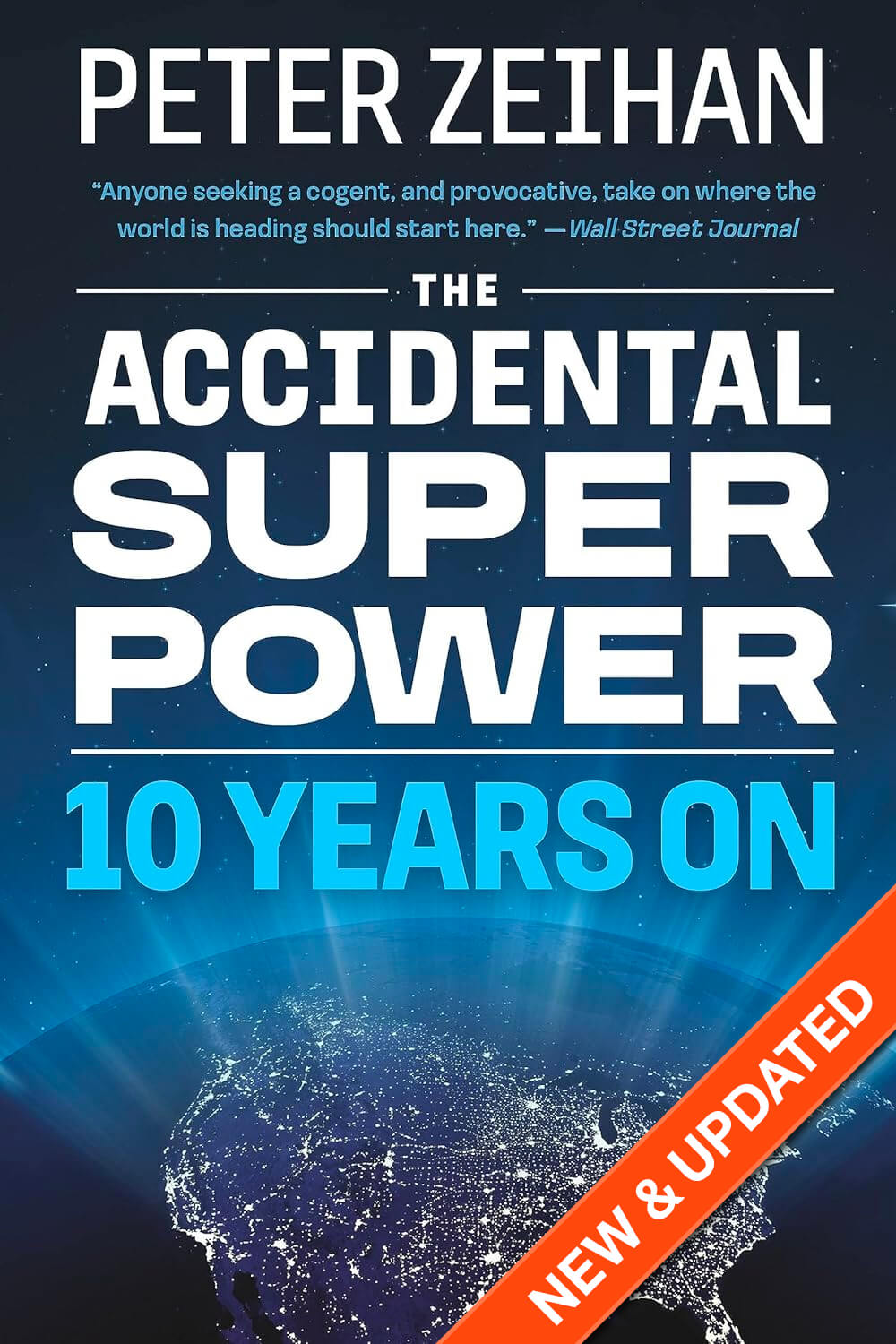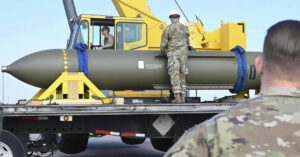FOR MORE ON THE FUTURE OF NORTHERN AFRICA, SEE DISUNITED NATIONS

The Accidental Superpower: Ten Years On
With a new “10 years later” epilogue for every chapter, comes an eye-opening assessment of American power and deglobalization in the bestselling tradition of The World is Flat and The Next 100 Years.
For our next installment in the ‘Post-American’ series, we’re looking at Northern Africa. This region only has a few countries that will turn out alright and a lot that will hurt for some time.
So, who’s topping the leaderboard? Countries like Morocco and Tunisia have a leg up thanks to their -somewhat- functional economies. On the flipside, countries like Algeria, Libya, and Egypt have an uphill battle ahead of them.
This region will be far from stagnant between military interventions, dependency on extra-regional powers, and a looming famine. But we’re only scratching the surface of this continent, so we’ll dive into Sub-Saharan Africa later in the series.
Here at Zeihan On Geopolitics we select a single charity to sponsor. We have two criteria:
First, we look across the world and use our skill sets to identify where the needs are most acute. Second, we look for an institution with preexisting networks for both materials gathering and aid distribution. That way we know every cent of our donation is not simply going directly to where help is needed most, but our donations serve as a force multiplier for a system already in existence. Then we give what we can.
Today, our chosen charity is a group called Medshare, which provides emergency medical services to communities in need, with a very heavy emphasis on locations facing acute crises. Medshare operates right in the thick of it. Until future notice, every cent we earn from every book we sell in every format through every retailer is going to Medshare’s Ukraine fund.
And then there’s you.
Our newsletters and videologues are not only free, they will always be free. We also will never share your contact information with anyone. All we ask is that if you find one of our releases in any way useful, that you make a donation to Medshare. Over one third of Ukraine’s pre-war population has either been forced from their homes, kidnapped and shipped to Russia, or is trying to survive in occupied lands. This is our way to help who we can. Please, join us.
TranscripT
Hey everybody. Peter Zeihan here, We’re going to do the most recent installment of our post-American series. We’re going to start talking about Africa, specifically North Africa. Now, so remember, from grade school, Africa is not just one place. Big continent larger than South America or Europe or Australia. Obviously gives North America a run for its size in every way that matters.
But it is split by the Sahara. So the population of North Africa has almost nothing to do with the population of sub-Saharan Africa. You’ve got a relatively thin coastal strip going from Morocco in the northwest into Algeria, and then it just stops. The Libyan part of North Africa is pretty dry. So once you get past Tunisia, there’s a little nub of territory by the Gulf of Sidra.
But the Gulf of Sidra and areas east are completely barren. In most places, the coastal strip where you get a little bit of rain is less than ten miles. And then, of course, eventually you get on the other side of the desert and you get to Egypt, which has a very different hydrological and cultural and economic history. So women work from west and east.
The key thing to remember about all of these areas is they’re utterly incapable of projecting power. Most of these zones have never had trees, so they don’t have a maritime tradition that’s worthy of the name. And industrialization came very late to them after independence, after World War Two, for the most part. And even then, it’s been very uneven because there aren’t a lot of resources to generate income.
And so there’s not an opportunity to generate a lot of education. And since the areas are so dry, the population has never been very substantial. So let’s start from Morocco. It’s probably the most functional of the North African states because it does rain a little bit more there. The Atlas Mountains do generate a little bit more impulse for agriculture and even industry.
And so in terms of most of the measures that most people care about it in Tunisia, which has a somewhat similar setup, have always been the most advanced countries, But it’s not enough to look after their own needs. Like a lot of developing countries in the post-World War Two era, these countries were able to develop certain sorts of income from, say, phosphate mining in the case of Morocco and a little bit of oil in the case of Tunisia.
And they use that to provide services for their population and to most importantly, buy food. So the carrying capacity of these lands is arguably higher than what is capable. And if something happens to irrational trade, famine is kind of be one of the major concerns moving forward. What Tunisia and Morocco do have going for them, though, is a much more sophisticated population with higher educational levels and a better relationship with outside powers.
So everyone in North Africa lacks the capacity to look after their own needs. All of them need to partner with someone. But these are two countries that have pretty good relations with someone. So in the case of Morocco, there’s a free trade agreement with the United States. In the case of Tunisia, they have pretty good relations with most of the Europeans and have been among the more liberal politically countries of the Middle East.
Now, liberal not like Democrat versus Republican, liberal like women can show their faces. People can get an education. The government doesn’t shoot everyone that they disagree with. And so both of these countries are going to be able to maintain kind of a know what’s not semi-independent. That’s not it. But their definition of sovereignty or their own issues. There aren’t a lot of resources to go after and they have a more capable population.
So it argues for negotiations in their future about issues of security and trade as opposed to anything that’s more neo colonial Algeria. Not so much. Algeria’s got oil and it lacks the technical capacity to keep its oil fields operational, much less expand them. Now, the Algerians, if they were given the choice, would only deal with the United States.
That’s because they actually have a colonial master that’s real close and that is the French. Relations between the French and Algerians have never been good. The French tried to hang on to Algeria during the colonialization process of the 20th century, to the point that the United States and the United Kingdom felt it was necessary to write into the NATO’s charter that things like the security guarantees of NATO’s Article five did not apply to Algeria.
And so when the Algerians fought for their independence, it was a brutal, bloody war that lasted years. Now, the French do have the technical expertise. It’s necessary to maintain the Algerian oil fields. But the Algerians have said repeatedly that they would rather not produce oil at all and descend into poverty and famine and let the French back in.
And unless and it’s unlikely the Americans are willing to step in to mediate this or manage Algerian oil, odds are we’re going to have some sort of reprise of the conflict between the Algerians on the French. And that is going to get ugly. There’s no way around that. The future of Algeria will be determined by how willing Algiers and Paris are to have a conversation as opposed to shoot at one another.
And that is very much to be determined. Libya, on a good day, is a failed state. The only way that Libya ever was able to achieve anything is under the rules of globalization and the globalized order where countries were not allowed to invade one another. But Libya is absolutely incapable of looking after itself. It’s arguably one of the more incompetent oil producers out there.
And since you have a very thirsty continent just to the north of it, there will be a military invasion in some form of what is left of the Libyan state with the Italians being the most likely power and maybe the French in second place, although they might cooperate on this. The future for Southwest Europe is one where France is calling most of the shots, including in Rome.
And so I can see sort of a condominium in Libya there. But there is no room whatsoever in the future for an independent Libya period. And that leaves us with Egypt, which is a very, very special case. The Egyptians have been around for a few millennia, arguably the oldest ethnicity in the world. The problem here is that they industrialize to a degree.
And so they were able to produce cash crops like cotton or citrus, that massive Lee earn massively more money on international markets than wheat. And they then used that money to buy wheat. Now, this kept the population relative quiescent because bread is heavily, heavily, heavily subsidized. But it means that the population is probably now double with the carrying capacity of the Nile Valley would be if they switched everything back to wheat today.
So we are looking at a mass famine event of biblical proportions later this century in Egypt’s future. The only question is how bad and how soon. I’ll give you an idea of how it could get really bad really quickly. The number one source of wheat that they import is Ukraine, and that’s gone. The number two source is Russia, and that’s on borrowed time.
There is no capacity for the world to ship enough emergency wheat supplies in to save the tens of millions of people who are going to starve to death. And that assumes nothing worse goes wrong. Remember, every country in this world, Project Power, can barely look after themselves. And there’s a big shakeup coming to the eastern Mediterranean. And it all depends upon what the Turks do.
The Turks have to decide what they want to focus on. And from the Egyptian point of view, they would dream of the Turks focusing to the southwest and on Egypt and Suez and the valley, because if that happens, then the Turks have a vested interest of getting food into Egypt in collaboration to a certain degree with Israel. But for that to happen, the Turks and the Israelis have to get along.
And so the Egyptians best case scenario is that the Turks agree to work with the Israelis, even though they don’t much care for Zionism and then focus a lot of aid money on Egypt to keep it alive. And that is a wish built on a wish, and it might well work out. But if it doesn’t, we’re looking at half the Egyptian population being in food danger.
And that’s before you consider something like climate change. If we get a really mild sea level rise over the next few decades, the entire Nile Delta, where half the population lives, is looking at getting, if not drowned, salt inundated, which will crush the ability of Egypt to grow food for its own people. So no matter which scenario you look at, Egypt’s time is ending.
It’s not that anyone’s going to take them over or erase the ethnicity, but the ability of Egypt to function as a state with its current population, it’s almost laughably unlikely. And the only question is how does that story end? But the only good news I have is that there’s probably not going to be a mass migration event because there’s a book in the Bible about how hard it is to get out of Egypt.
Physical infrastructure linking the valley to the rest of the world is almost nonexistent. And that means Egypt was going to suffer and maybe even die more or less in silence.








